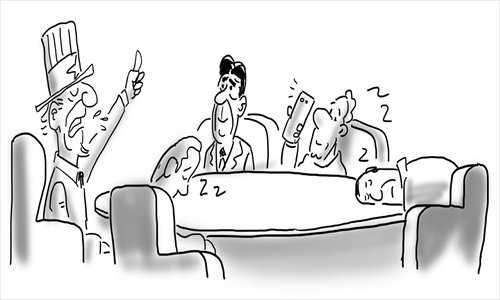US-ASEAN summit no diplomatic coup

Illustration: Liu Rui/GT
The leaders summit between the US and the Association of Southeast Asian Nations (ASEAN) will officially take place on Monday and Tuesday in Sunnylands, California. US Assistant Secretary of State Daniel Russel said that the meeting "is the culmination of a seven plus-year investment the US has made first and foremost in the Asia-Pacific region." From the perspective of US President Barack Obama, this will be his last chance to host this summit. More than others, the meeting will endow his iconic "rebalance to the Asia-Pacific" strategy with fresh significance. Washington will optimize the use of this opportunity to make noise over political, economic and security issues, and show its influence on East Asian affairs.
For Obama, who is in his final year in office, the conference itself already stands for his diplomatic success. How many substantial results will be achieved during the summit is relatively less important.
The summit does not mean the coming of a critical moment in the competition between China and the US in the Asia-Pacific, nor does it predicate a new turning point of the security situation in East Asia. It also doesn't imply the White House's "rebalance to the Asia-Pacific" strategy has reached a new level.
A summit between leaders from the US and ASEAN itself is not surprising. Instead, it is worth noticing that Washington has spared no effort in promoting its rebalance to the Asia-Pacific over the past years. But if such a meeting with ASEAN nations could really play an important role in piling security pressure on China, why did the US put off hosting it until 2016?
The significance of the US-ASEAN leaders' summit might not be as great as it was advertized. The promotion of its rebalancing in Asia mainly depends on its allies and security partners such as Japan, Australia, the Philippines and Vietnam, instead of a single international organization. Even in the economic field, the US is attaching more importance to the Trans-Pacific Partnership (TPP), for which the White House can hand pick its partners as it wants, rather than having large-scale negotiations with all the countries in the area. Obviously, the US is well aware of the complicated relationships within ASEAN.
If a summit between ASEAN and any major power could solve key issues diplomatically, then China is far ahead of the US. As early as in 1997, China and ASEAN leaders held their first leaders summit and issued a joint statement. From then on, the two sides have further institutionalized the conference. So far, 18 leaders meeting between China and ASEAN countries have taken place. Such a summit is of great political and diplomatic importance, but it does not mean that all the significant issues can be solved or consensus can be reached through this single way.
We cannot interpret the US-ASEAN summit as ASEAN nations having decisively picked the side of the US. ASEAN has had 10+1 leaders' meetings with China, Japan and South Korea, and none of them has the meaning of taking sides.
The minds of most Southeast Asian countries are far more complicated than taking sides between China and the US. They are glad to see both Beijing and Washington compete for ASEAN, because they can thus take more advantages for themselves from both sides. In comparison, conclusively picking one side will not necessarily increase their benefits, but might bring them more pressures instead.
In light of this, most Southeast Asian nations will not change their balancing diplomatic strategy among major powers, nor will they change their practice of hedging their bets on both China and the US. Therefore, even if the US is dreaming of piling pressure on China with the help of the ASEAN countries, the latter will not easily become Washington's cat's paw.
On that score, the summit will neither break the deadlock of the South China Sea issue, nor provide the US more bargaining chips to raise its initiative in regional topics such as the South China Sea issue. If the White House tries to push on certain sensitive issues, it will likely expose divergences between relative countries more clearly.
The author is a professor at the Guangdong Research Institute for International Strategies. opinion@globaltimes.com.cn